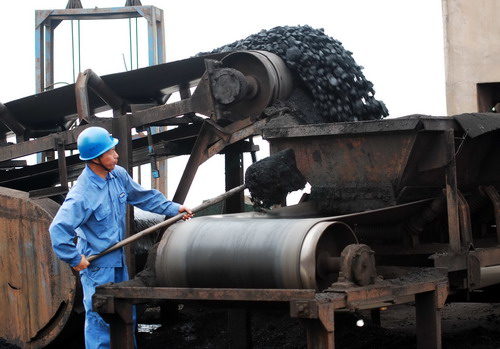Tight electricity supply to return during winter
Updated: 2011-09-30 09:51
By Zhou Yan and Du Juan (China Daily)
|
|||||||||||
|
 A worker loads coal in Jiujiang, Jiangxi province. Chinese officials said severe drought in the southwest will exacerbate energy shortages in the winter. [Photo/China Daily] |
BEIJING - China's power supply will be tight this winter after a brief autumn respite because of a demand spike and uncertain weather conditions in the coldest season, officials from the National Development and Reform Commission (NDRC) said on Thursday.
Generally speaking, domestic demand for coal and natural gas for electricity generation is relatively high during the winter, said Jia Fusheng, deputy director-general of the economic operations adjustment bureau of the NDRC, the country's top economic planner.
Severe drought in the southwest, including Guangxi Zhuang autonomous region and Guizhou province, will exacerbate the looming shortages, Jia said.
China, the world's biggest energy consumer, just went through its peak annual electricity consumption period.
The country used 1.27 trillion kilowatt-hours (kWh) of power from June to August, up 11.2 percent year-on-year, National Energy Administration (NEA) figures show.
"After an easing in the supply shortage in September and October, demand growth will pick up again," Jia said.
From January to August, the chemical, building material, ore and steel smelting and non-ferrous metal sectors are among the top energy users.
This year, these industries consumed 1.02 trillion kWh of electricity during the January-August period, accounting for 32.6 percent of the country's total.
Relentless surge
The relentless surge in power demand is being driven by the smokestack industries, which generate less economic benefit, said Hao Weiping, deputy head of the NEA's electric power bureau.
As such, the adjustment of the economic and industrial structures is crucial to ease the electricity shortages that have cast a shadow on the nation's robust economic growth, Hao said.
In addition, some power plants in China, which relies heavily on coal for its electricity, lost money because of rising coal prices, which led them to halt power generation during the summer, according to the NEA.
Figures from cqcoal.com, China's major coal trading website, showed that the price of thermal coal at Qinhuangdao port reached 830 yuan ($124) a ton on Sept 9, up 16.9 percent year-on-year.
Coal prices have been increasing since the beginning of September and that trend will persist until the end of the year, said Dai Bing, a senior analyst at coal trading website coal.com.cn.
"Coal prices will increase by 30 yuan a ton by the end of October," he forecast.
Even though coal demand will climb in the winter after a brief slowdown in the autumn, coal supply in the fourth quarter is expected to be balanced, said Wei Pengyuan, deputy head of the NEA's coal bureau.
Wei said increasing production capacity will come onstream as several mid-sized to large modern mines are put into use, and more mines will resume production that was suspended during mergers and restructuring.
Some electricity companies can achieve an annual coal production capacity of 60 million tons with a self-sufficiency rate of about 20 percent, Wei added.
China is also stepping up the creation of coal reserve bases to fill periodic supply gaps, Jia said.
"One of the top priorities is to select appropriate locations for the reserve bases and let them play their critical role at the critical time," Jia said.













